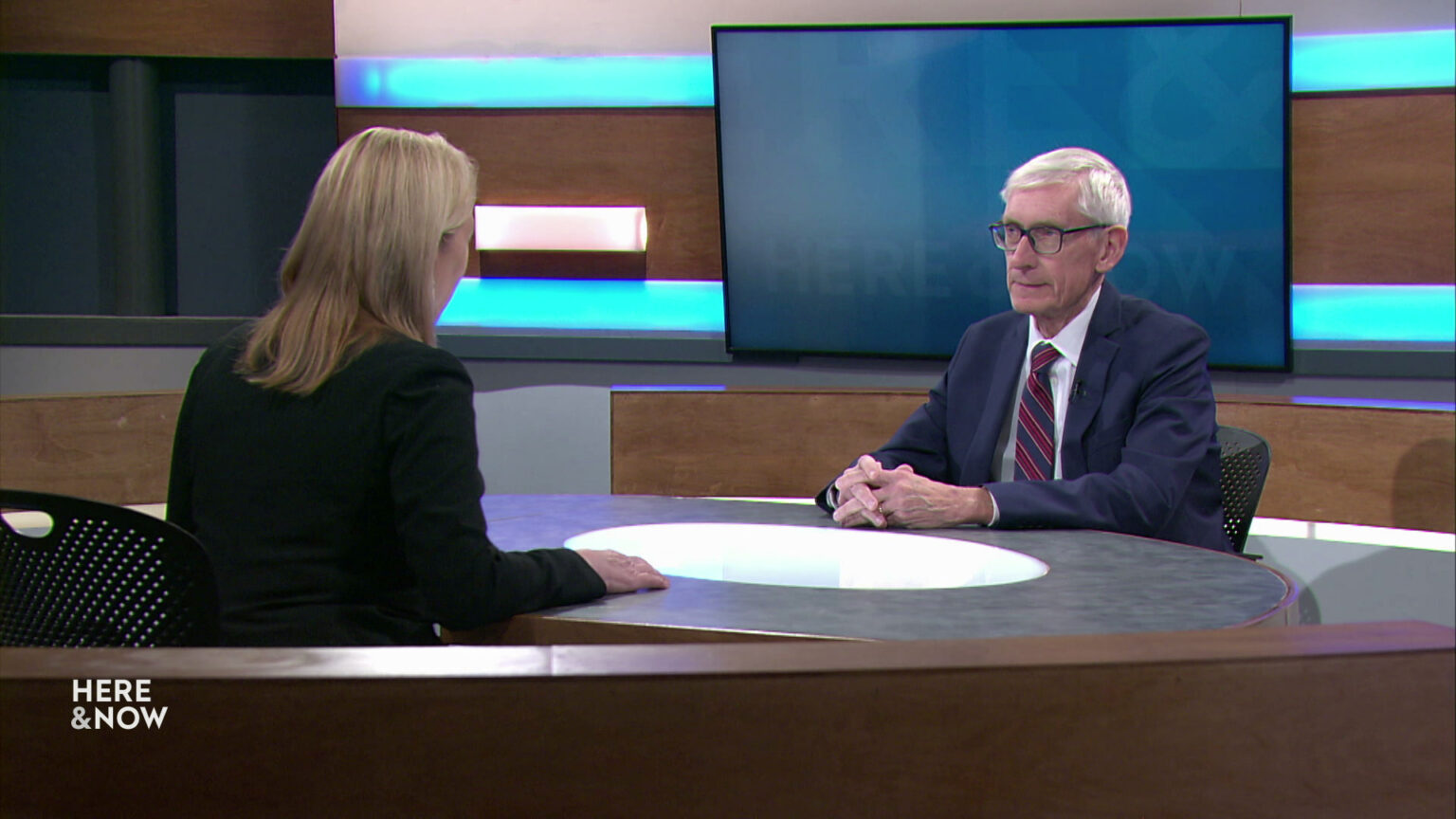'Here & Now' Highlights: Gov. Tony Evers, Superintendent Jill Underly
Here's what guests on the Jan. 5, 2024 episode said about new legislative district maps for the 2024 elections and spending state budget surplus funds on special education.
By Frederica Freyberg | Here & Now
January 8, 2024

Frederica Freyberg and Gov. Tony Evers (Credit: PBS Wisconsin)
Gov. Tony Evers started the New Year buoyed at the prospect of the Wisconsin Supreme Court ordering new voting maps, predicting what he views as fairer legislative district will be in place for 2024 elections. Evers also spoke to other lawsuits before the high court, including one related to the powers of the governor’s office and Legislature on state spending. The projected state budget surplus continues to top $7 billion – Wisconsin Superintendent of Public Instruction Jill Underly is calling on spending some of that money to boost K-12 special education funding.
- The Wisconsin Supreme Court set a deadline of Jan. 12 for submission of redistricting maps for the Legislature in its ruling overturning the current districts. Evers, a Democrat, said he does not expect to agree with the lines Republican lawmakers draw, which will leave the map-making to the high court’s consultants. Despite desires of Republicans to get the Wisconsin redistricting case before the U.S. Supreme Court, he predicted that will not happen – and Wisconsin will have new legislative district maps for the 2024 elections.
- Evers: “You hear that on a regular basis that something’s going to go to the Supreme Court or whether it’s this or something else. The last time we were there the Supreme Court had some concerns about the Voting Rights Act, and that caused our maps to be thrown out. So we are very cognizant of the Voting Rights Act. We’re not going to be violating it. And we can get this done if it goes to the Supreme Court. Last time they said we did our work. You do your work back at the state level. State is a place where this has to be resolved.”
- The maps lawsuit is only one of multiple high-profile issues before the Wisconsin Supreme Court. A challenge to an 1849 state law that has been interpreted as banning nearly all abortions in the state is on its way to the high court, after a circuit court judge ruled it does not apply to the procedure. Evers has also filed a lawsuit challenging actions of Republican lawmakers in the state Legislature related to budgetary decision making, arguing it violates constitutional separation of powers. Despite a deal struck between the Universities of Wisconsin and Republicans over diversity staffing, employee pay raises and other issues that was cited as a prime example of what the governor is objecting to, Evers said the case remains relevant:
- Evers: “We had a budget, we passed the budget, the budget was set. We had 4%, or whatever the percent increase was. That should’ve been done, instead of, how can you negotiate against what’s in state law? And that’s exactly what they did. In the same vein, the Republicans in the budget had issues around DEI, to clamp down on that. I vetoed that. They couldn’t override that veto. Again, the idea that somehow they can bypass the executive branch on that is just unacceptable. I anticipate winning that race, or winning that case in court. And bring some sanity to what’s going on between the executive branch and the legislative branch.”
Superintendent Jill Underly
Superintendent of Public Instruction
- Underly is calling to use $1 billion of the state’s projected more than $7 billion surplus to increase special education reimbursement rates to school districts to 60% – a rate that now stands at 33%. The Republican Legislature rejected a proposed billion dollar boost during the 2023 budget process, but Underly said the increase is sorely needed.
- Underly: “We need to fund our public schools and special education reimbursement right now is so low that school districts have to transfer money from their general fund in order to pay for the services, which are required by law. So if we were to increase the reimbursement rate, they wouldn’t have to transfer as much money. And we’re also serving kids, and we’re able to then fund the other programs that schools desperately need to fund. … When you look at the number of referendums that school districts have to go to, it’s because they need the funding. They’re not getting reimbursed.”
Watch new episodes of Here & Now at 7:30 p.m. on Fridays.
 Passport
Passport











Follow Us